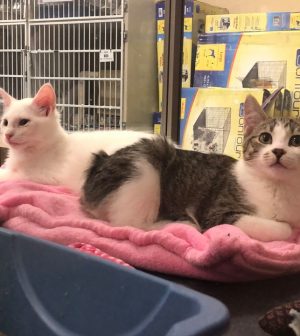During the spring and summer months, the Nebraska Humane Society (NHS) is typically FULL OF CATS anyway, but with the renovation of the shelter’s lobby and adoption area, room for all those kitties is even harder to come by.
As construction continues at the shelter, the facility has moved its adoption spaces into overflow areas, so space is tighter than it usually is. This circumstance added to the summer influx of cats makes for lots of cats at NHS. And when there’s no more space for a shelter (especially one that is charged with a city’s animal control), things get tough. Luckily for the NHS, though, it made a Colorado friend some time back in Larimer Humane Society.
The Loveland, CO, shelter had offered to take cats from the NHS at a different time, so it reached out to Larimer when things got full these past few weeks. Good news resulted- Colorado could take about 20 cats.
“We have a large disaster trailer that easily holds that many crates and is climate controlled,” said Pam Wiese, VP of Marketing at NHS, “but we needed a more road-worthy vehicle to make the 9-hour trek.” More good news- Baxter Subaru in Omaha is a supporter of NHS an it worked its contacts, eventually donating the use of a truck so the cats could make their journey west.
At about 4 am Saturday morning, the NHS transport team loaded up 22 cats who were spayed or neutered, microchipped, and vaccinated into the trailer for the journey. They left around 5 am, made several stops just to check on kitties as they traveled across the state, and arrived early afternoon at Larimer Humane Society.
Those cats and kittens, vetted and healthy, went directly into the adoption cattery at the Larimer Humane Society and have a bright future, Wiese said. “We at NHS love the collaboration that shelters across the country have. We are happy to take animals in when we have room and we are also grateful to those who will help us out when we are crowded!”
This is not a rare occurrence in rescue/shelter work by any means, which is both a good and bad thing. The good includes what Wiese referenced above- the willingness to work together. The bad includes the fact that there is a need to find shelter for so many displaced animals nearly all the time. The more we all work together, though, the better the “bad” will become. More education, more responsible owners, and fewer homeless animals will result from the work our pet communities do all day, every day.



















You must be logged in to post a comment Login